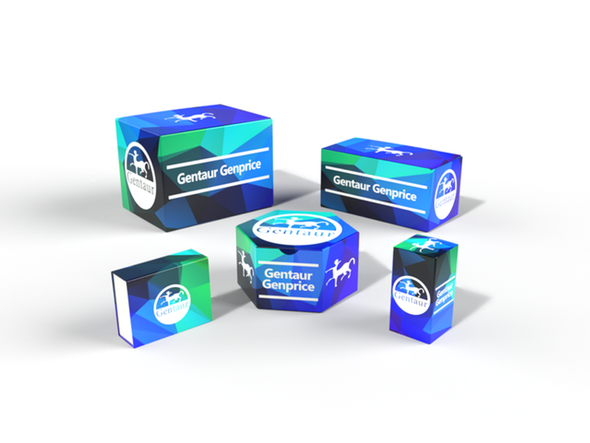Description
GCNT1 Antibody | 61-377 | Gentaur UK, US & Europe Distribution
Host: Rabbit
Reactivity: Human, Mouse
Homology: N/A
Immunogen: This GCNT1 antibody is generated from rabbits immunized with a KLH conjugated synthetic peptide between 88-117 amino acids from the Central region of human GCNT1.
Research Area: Obesity, Signal Transduction
Tested Application: WB, IHC-P
Application: For WB starting dilution is: 1:1000
For IHC-P starting dilution is: 1:50~100
Specificiy: N/A
Positive Control 1: N/A
Positive Control 2: N/A
Positive Control 3: N/A
Positive Control 4: N/A
Positive Control 5: N/A
Positive Control 6: N/A
Molecular Weight: 50 kDa
Validation: N/A
Isoform: N/A
Purification: This antibody is prepared by Saturated Ammonium Sulfate (SAS) precipitation followed by dialysis
Clonality: Polyclonal
Clone: N/A
Isotype: Rabbit Ig
Conjugate: Unconjugated
Physical State: Liquid
Buffer: Supplied in PBS with 0.09% (W/V) sodium azide.
Concentration: batch dependent
Storage Condition: Store at 4˚C for three months and -20˚C, stable for up to one year. As with all antibodies care should be taken to avoid repeated freeze thaw cycles. Antibodies should not be exposed to prolonged high temperatures.
Alternate Name: Beta-1, 3-galactosyl-O-glycosyl-glycoprotein beta-1, 6-N-acetylglucosaminyltransferase, Core 2-branching enzyme, Core2-GlcNAc-transferase, C2GNT, Core 2 GNT, GCNT1, NACGT2
User Note: Optimal dilutions for each application to be determined by the researcher.
BACKGROUND: Glycosylation is one of the most universal but at the same time complex protein modifications. Modification with sugar moeties can be both co- translational and post- translational, occurring in the endoplasmatic reticulum and golgi. Three different forms of glycosylation can be distinguished: N-linked oligosaccharides, O-linked oligosaccharides and glycosyl- phosphatidylinositol (GPI-) anchors. Glycosylation results in thousands of distinct, bioactive glycoproteins resident throughout the cell that strongly determine protein-protein, carbohydrate-protein, membrane, and adhesion properties. Diseases associated with glycosylation defects include Congenital disorders of glycosylation, (CDG) , also known as carbohydrate deficient glycoprotein syndromes, and diseases associated with advanced aging.





![GCNT1 Antibody (Center) [AMM04752G] GCNT1 Antibody (Center) [AMM04752G]](https://cdn11.bigcommerce.com/s-1rdwiq712m/images/stencil/590x590/products/57580/57884/gentaur-genprice__26005.1661610467__29809.1661628092__75433.1661676199__77988.1661684280__64362.1661692443__56613.1661854107.png?c=1)
